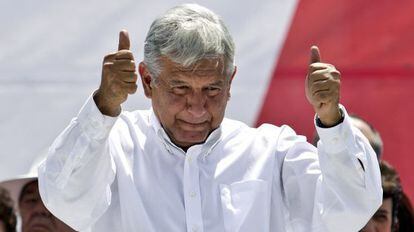Mexico’s López Obrador registers new leftist party to run in 2015 election
Critics warn that new group Morena will break up unity of the left and lead to less representation


Former presidential candidate Andrés Manuel López Obrador has secured official approval for his new party, the National Regeneration Movement (Morena), paving the way for a run for office in 2015.
Mexico’s National Electoral Institute has finally granted legal status to the veteran politician’s leftist movement, which he founded before the 2012 elections but only got approval for after an 18-month battle that took its founder all over the country. Morena will now be able to present a candidate in the 2015 elections, when Mexicans will vote for members of Congress and new leaders for 17 federal agencies. They will also elect nine governors, 661 local representatives and 1,015 mayors.
This new organization, fashioned after its leader – once head of the Party of Democratic Revolution (PRD) and now the fiercest opponent to President Enrique Peña Nieto’s energy reforms – changes the political landscape and puts the PRD in a tight spot.
“The only thing Morena will do is break up and weaken the left, which will lead to less representation in Congress,” says José Antonio Crespo, a lecturer at Centro de Investigación y Docencia Económicas.
The 60-year-old politician, who suffered a heart attack in December, has run for president twice, in 2006 and 2012
“The movement has two sides. One is good and the other is bad,” says political analyst Agustín Basave. “The good news is that it puts another option on the political menu. The bad news is that since 1977 the left had been growing into a more unified force, contrary to what was happening in the rest of the world. This is the first split in nearly half a century. I predict that PRD and Morena will each get single-digit percentages in next year’s elections, which will be unfortunate for social democrats.”
When the country’s main political parties signed the Pact for Mexico with Peña Nieto on December 2, 2012, López Obrador officially left the PRD. The politician, who is also known as “El Peje,” had already announced his plans to quit the party in September. Mexico’s electoral tribunal had just upheld the Institutional Revolutionary Party (PRI) victory in July and a good number of PRD members left with him.
“The law said we had to hold 20 state assemblies and we had 30. They asked us for 219,000 members and we had 600,000,” says Martí Batres, Morena’s executive committee president. Batres has had a long relationship with López Obrador. In 2003, he was the Tabasco native’s top aide during his term as Mexico City mayor. He was the social development secretary and he fought to run on the PRD ticket in the 2012 local elections. But he lost that battle to Miguel Ángel Mancera who is now the incumbent mayor. Besides serving as a Mexico City representative, Batres was the director of the party’s local chapter in 2005 and 2006. In November 2012, he left PRD after 24 years of service.
Morena is a “leftist, democratic, patriotic, socially conscious” political organization “that wants to implement a platform based on equality, social justice, democracy, freedom and national sovereignty,” Batres says. He also says that PRD no longer represents those values.
The good news is that it puts another option on the political menu. The bad news is that it is the first split in the left in nearly half a century”
“PRD leaders and most of its legislators voted for the fiscal reforms [raising taxes and gas prices] and with their collaboration they paved the way for privatization of the oil industry,” López Obrador wrote on a social media site on June 7 in response to Cuauhtémoc Cárdenas, the moral leader of the PRD, who had criticized him for forming his own party.
“Andrés Manuel represents hope for change, a clean and honest leadership, closeness to the people, a defense of this country and a future for Mexico,” Martí Batres says.
“He is Morena’s main and only asset,” José Antonio Crespo adds.
The 60-year-old politician, who suffered a heart attack in December, has had a long career that goes back to the 1970s. He has run for president twice, in 2006 and in 2012. He refused to acknowledge defeat to Felipe Calderón and then to Enrique Peña Nieto and called for mass demonstrations on both occasions. “AMLO [Andrés Manuel López Obrador] represents the future because this country has not changed,” Batres says. “Mitterrand in France, Lula da Silva in Brazil and Salvador Allende in Chile ran several times before they won and Nelson Mandela spent 27 years in prison. He, too, has had a very long career.”
The party’s position on energy is clear, but the same cannot be said for issues such as same-sex marriage
Morena’s role in the political scene will grow in the next few weeks as the country debates the secondary energy reform laws, which will put an end to the state’s monopoly on hydrocarbons. This is López Obrador’s hobbyhorse and where he wants to re-emerge as leader of the opposition.
Morena has already taken the lead in mobilizing the nation. In December, a group of its supporters formed a human chain around the Senate building.
Although the party’s position on energy policy is clear, the same cannot be said for issues such as same-sex marriage (“Every state in the country is at a different level,” Batres says) or reproductive rights (“Women should not be punished for abortions, but it is an issue we have to discuss at length within our organization”). Feminists do not see Morena as an ally. “They have not said in public that they are against legal abortions but, whenever the issue comes up, they say there should be a nationwide referendum. López Obrador is a Christian and this is not a priority on the party’s agenda,” sources say.
Now that Morena is an official party, it will receive 50 million pesos every month starting on August 1. Every party gets an equal share of 30 percent of the budget set aside to finance political organizations. Every year, the electoral institute awards what it calls “prerogatives.” Thirty percent is split evenly among all parties while 70 percent is distributed based on the number of votes received in the last national elections. Since Morena has not yet run for a national seat, it will only receive its portion of that 30 percent. The organization will also have a voice in the electoral institute’s council, offices at their establishment and privileges on radio and TV.
AMLO’s campaign has just begun.
Translation: Dyane Jean François










































